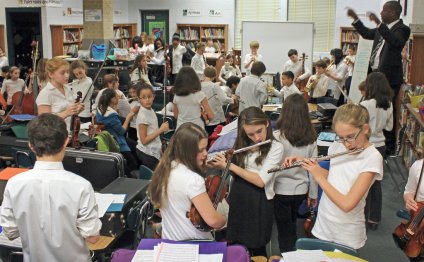
Music lesson plans for Toddlers
 By John M. Feierabend, Ph.D.
By John M. Feierabend, Ph.D.
The Thirty Year Plan
Musical behavior is basic to all cultures, both primitive and sophisticated. And yet, in our enlightened late twentieth century there appears to be plenty of evidence that many are losing this basic dimension of expressing themselves. It should not be unreasonable to expect all adults to be able to clap their hands in time to the cheering at a sporting event. Dad should be able to sing “Happy Birthday” to his son or daughter without hearing, “Don’t sing, Dad.” A couple should be able to dance in time to the music at their wedding. A person should be able to sing at a worship service without persons in the row in front turning around. An audience member should possess sufficient sensitivities to be moved by a nuance in an orchestral performance. A mother or father should be able to soothe their infant with a lullaby and rock to the beat of that lullaby.
Still many persons have not developed basic sensitivities which would allow them to function musically in society. Most adults should be able to demonstrate basic musical behaviors including
- comfortable and accurate singing;
- comfortable and accurate moving;
- expressive sensitivity when listening and/or responding to music.
While elusive of definition, the third behavior-expressive sensitivity when listening and/or responding to music-is critical in coming to understand the communication of music. In The Republic, Plato speaks about music as an art form, in that music has the potential to deliver a message “below the surface.” When a fine composer creates compositions, he/she uses the tools of music to communicate something below the surface. It is hoped that such compositions will, then fall into the hands of insightful performers who will realize the composer’s communicative intent in the music. Still, if the audience lacks the expressive sensitivity necessary to hear the message below the surface, that message has fallen on deaf ears. Necessary sensitivities to the expressive qualities in music must be nurtured during the earliest months of life.
If we believe adults should be able to sing to their children and dance with their spouses and appreciate good quality music literature, then we must sing to our babies, and dance with our babies, and do both with quality children’s music literature. Then when those babies become 30 years old, they will be musically sensitive and be able to provide an appropriate nurturing musical environment for their children.
One hundred years ago many families instinctively engaged their very young children in activities that were ideal for developing musicality. No one studied early childhood music education, and there was very little need for classes to be offered to infants and toddlers with their parents.
YOU MIGHT ALSO LIKE



Share this Post
Related posts
Music lesson plans for Kids
Music not only has the power to stimulate the mind, enrich the heart and soothe the soul; it also helps you meet educational…
Read MoreNative American Music lesson plans
Lesson Four- The Strength of Native American Music The following lesson is designed to be used after viewing all or part…
Read More
 A lesson is a structured period of time where learning is intended to occur. It involves one or more students (also called pupils or learners in some circumstances) being taught by a teacher or instructor. A lesson may be either one section of a textbook (which...
A lesson is a structured period of time where learning is intended to occur. It involves one or more students (also called pupils or learners in some circumstances) being taught by a teacher or instructor. A lesson may be either one section of a textbook (which...










